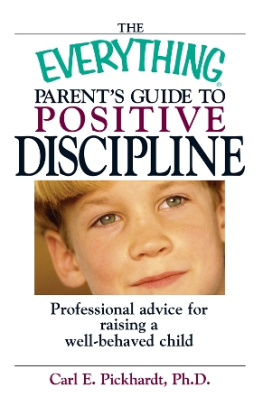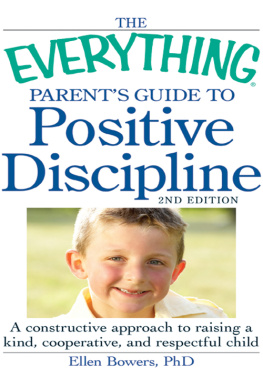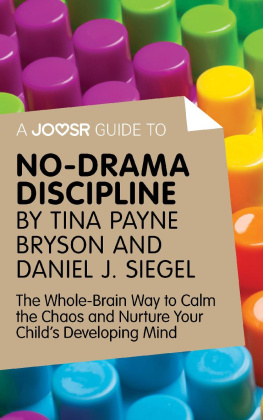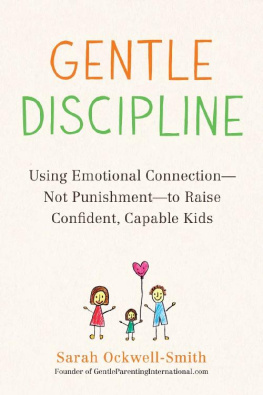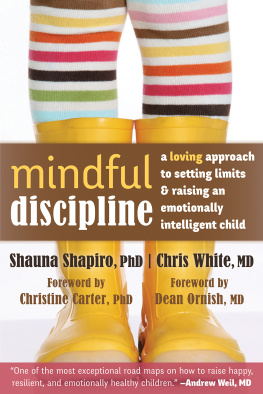No Bad Kids
Toddler Discipline
Without Shame
By Janet Lansbury
No Bad Kids: Toddler Discipline Without Shame
Copyright (c) 2014 by Janet Lansbury
Published by JLML Press, 2014
All rights reserved. No part of this publication may be reproduced, distributed, or transmitted in any form or by any means, including photocopying, recording, or other electronic or mechanical methods, without the prior written permission of the publisher, except in the case of brief quotations embodied in critical reviews and certain other non-commercial uses permitted by copyright law.
For permission requests, please email the publisher, subject line: Elevating Child Care Permissions at MBLansbury@gmail.com
All identifying details, including names, have been changed except by permission and for those pertaining to the authors family members. With exceptions, material contained in this book is available on the authors website. This book is not intended as a substitute for advice from a licensed professional.
~
Cover Photo and Design: Sara Prince
bonzochoochmushyandme.com
For more information about the author, please visit her website at: JanetLansbury.com
Table of Contents
Forward
When it comes to discipline, parents are faced with a deluge of disparate expert advice that can be perplexing, contradictory, and sometimes just plain impossible to follow. Should parents spank, bribe, reward, ignore, give consequences, or order a time-out? Does gentle discipline mean letting children rule the roost? Should parents use threats, distractions, games, charts, timers, count to three, or perfect that look?
Its no wonder so many parents are confused, frustrated, and paralyzed. Its no wonder they find themselves losing their confidence, and often their tempers.
It doesnt have to be that way.
Unlike the majority of prominent child development advisers on discipline, Ive spent years in parent/toddler classrooms putting theory into practice. Ive witnessed (a thousand times over) the kinds of interventions and responses that actually work, as well as the ones that never work, and the ones that might work once or twice but ultimately create even bigger power struggles or undermine trust between kids and their parents.
Toddlers, especially, are prone to pushing limits. It is their job as active learners and explorers and developmentally appropriate. It is a natural expression of their intense mix of emotions as they struggle to become more autonomous. Successful guidance provides children the safety and comfort they need to flourish. When boundaries work, children dont need to test them as often. They trust their parents and caregivers; therefore, their world. They feel freer and calmer and can focus on the important things: play, learning, socializing, and being happy-go-lucky kids.
When setting limits, the emotional state of the parent almost always dictates the childs reaction. If we lack clarity and confidence, lose our temper or are unsure, tense, frazzled, or frustrated this will unsettle our kids and very likely lead to more undesirable behavior. We are gods in our childrens eyes, and our feelings always set the tone. With this understanding, its easy to see why struggles with discipline can become a discouragingly vicious cycle.
As the title of this book states, in my world there are no bad kids, just impressionable, conflicted young people wrestling with emotions and impulses, trying to communicate their feelings and needs the only way they know how. When we characterize them as bad because were frustrated, confused, or offended by their behavior, we are doing them a great disservice. It is a negative label, a source of shame they may eventually start to believe about themselves.
My parenting philosophy and my perception of children and our relationships with them are all informed by the teachings of my friend and mentor, child specialist Magda Gerber. Through Magda and the organization she founded, RIE (Resources for Infant Educarers), I gained clarity as a mother and developed the respectful, fulfilling, effective approach to parenting that Ive shared with millions of others as a teacher and writer.
At the core of RIE Parenting is a radical concept:
Babies are whole people sentient, aware, intuitive and communicative. They are natural learners, explorers, and scientists able to test hypotheses, solve problems, and understand language and abstract ideas.
Not what one would consider conventional parenting wisdom, but clinical and scientific findings and published research* have confirmed these amazing infant abilities that Magda Gerber recognized 50 years ago.
Yet all too often we are still treating our infants and toddlers as if they are vacant, unaware, and incapable of understanding or communicating with us. Conversely, we might expect our children to be able to handle adult situations (like an afternoon shopping excursion at the mall) with a level of maturity and emotional self-control they have not yet developed. These inaccurate perceptions can lead parents in an unproductive direction, especially in regard to discipline issues.
Ultimately, the big secret to successful discipline is ditching the quick-fix tricks, gimmicks, and all other manipulative tactics and simply being honest with our babies and toddlers (What a concept!). This is the most basic level of respect RIE teaches, and embracing it is as liberating as it sounds.
This book is a collection of my articles pertaining to common toddler behaviors and how respectful parenting practices can be applied to benefit both parents and children. It covers such common topics as punishment, cooperation, boundaries, testing, tantrums, hitting, and more.
I am privileged to receive a steady stream of letters from parents with questions and concerns about discipline. Loving, thoughtful parents simply want to know how to give their kids healthy limits and gain their cooperation. Many are at their wits end and desperate for answers.
Other letters, which are usually the highlight of my day, are personal success stories describing a toddler dilemma and how the parent addressed it by putting respectful care principles into action. I have included several of these letters in this collection, along with my responses, because they are illuminating, relatable, and encouraging.
My hope is that this book will serve as a practical tool for parents who are anticipating or experiencing those critical years when toddlers are developmentally obliged to test the limits of our patience and love. Armed with knowledge and a better sense of the world through our childrens eyes, this period of uncertainty can afford a myriad of opportunities to forge unbreakable bonds of trust, respect, and love.
*Gopnik, Alison (July, 2010). How Babies Think. Scientific American, 76-81
Chapter 1: No Bad Kids
A toddler acting out is not shameful, nor is it behavior that needs punishing. Its a cry for attention, a shout-out for sleep, or a call to action for firmer, more consistent limits. It is the push-pull of your toddler testing his burgeoning independence. He has the overwhelming impulse to step out of bounds, while also desperately needing to know he is securely reined in.
There is no question that children need discipline. As Magda Gerber said: Lack of discipline is not kindness, it is neglect. The key to healthy and effective discipline is our attitude.
Toddlerhood is the perfect time to hone parenting skills that will provide the honest, direct, and compassionate leadership our children will depend on for years to come. Here are some guidelines:
1. Begin with a predictable environment and realistic expectations. A predictable daily routine enables a baby to anticipate what is expected of him. That is the beginning of discipline. Home is the ideal place for infants and toddlers to spend the majority of their day. Of course, we must take them with us to do errands sometimes, but we cannot expect a toddlers best behavior at dinner parties, long afternoons at the mall, or when his days are loaded with scheduled activities.
Next page


